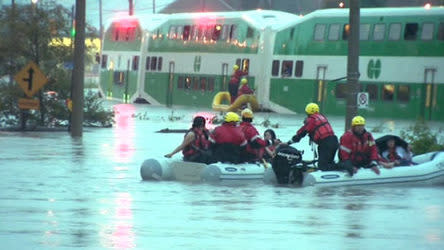Toronto floods: What you need to know about insurance
Toronto was recovering Tuesday after record rain fall drenched the city the night before, flooding parts of the city, knocking out power and leaving thousands of commuters stranded or wading through water to get home.
The storm dumped 126 millimeters of rain on the city, more than the usual amount of 74.4 mm for the entire month of July. Over the next 24 hours, Environment Canada expects anywhere from 5-25 mm more rain.
Monday's storm flooded major traffic arteries and left them virtually abandoned or dotted with cars half-submerged in water, while images showed water had risen to seat level inside some GO train cars. At the height of the event, approximately 300,000 customers were without power, according to Toronto Hydro.
As the city dries out, residents need to "first and foremost, call your insurance representative and be safe," said Steve Kee of the Insurance Bureau of Canada.
"People need to deal with issues of floods in basements as quickly as possible," he said. "You can't leave water damage in an area. You need to dry a flooded area in a few days to prevent the growth of mould."
What is covered?
Sewer backup happens when drains get blocked by debris or overflow of heavy rain. Sewer backup coverage is normally available for residential policies, though it is not automatically included in all home insurance policies. It is offered as optional coverage that you can purchase, according to IBC.
Overland flood is generally not covered under residential insurance policies. Overland flood damage usually occurs when water enters your home because bodies of water such as rivers, streams, and lakes overflow and cover normally dry land.
Storm damage is typically covered by residential insurance policies. However, it is important to note that most policies exclude damage caused if either a window or door is left open, or the building is in poor repair. Storm damage normally occurs when rainwater enters your home through an opening created by a storm i.e. if the roof or a window is damaged during the event.
Also remember to ...
Be safe: If your basement is flooded do not wade through it until you know it's safe. Turn off your breakers, if it's safe to do so, or call an electrician. Check that all appliances, mainly stove tops, that were 'on' at the time of the power outage are now turned off to avoid a fire hazard, advises Toronto Hydro. As well, think about health and safety when cleaning up. Don't stack wet and dry items on top of each other. It's highly possible to be exposed to contaminants carried by flood water.
Call your insurer: If there's water all around you, don't worry too much about salvaging personal items. Call your insurer first. Most should have 24-hour emergency lines. If you can't find your policy, call them anyway. They should be able to find you in their system. In Ontario, the Insurance Bureau of Canada can assist at 1-800-387-2880.
Document everything: Take photos and video of your surroundings. That should help your insurance claim go more smoothly. Don't throw anything away until an adjuster has seen the damage as it might be covered. Remember to keep all receipts if you get any emergency work done on your home.
If you need to move out: It may not seem necessary, but lock all your windows and doors and do everything to protect your property. If there is a sewage backup, most policies will have alternative living arrangements for homeowners and tenants.

 Yahoo Finance
Yahoo Finance 

